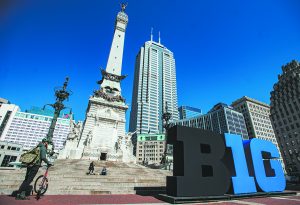Indiana announces second COVID-19 case, also connected to Boston conference
The patient is from Hendricks County and attended a BioGenconference in Boston, where numerous other cases of COVID-19 have been reported.

The patient is from Hendricks County and attended a BioGenconference in Boston, where numerous other cases of COVID-19 have been reported.

A conference and trade show that was expected to draw nearly 10,000 people to Indianapolis is the first local convention to be postponed or called off due to the virus.
Tracking down who might have come into contact with the first patient to test positive will require plenty of legwork, and more cases are sure to arise, officials said.
Just weeks since most economists bet the China-led slump would quickly reverse once the virus was contained, many are rethinking that optimism as swathes of Chinese factories stay shut and workers idled.
Gov. Eric Holcomb said that in response he has declared a public health emergency so the state can seek federal funding to help control and stop any spread of the coronavirus.
Evidence is mounting that the disease is most likely to result in serious illness or death among the elderly and people with existing health problems.
After announcing that Indiana has confirmed its first case of COVID-19, state health officials released information about how coronaviruses are spread and how to protect yourself.
CourseNetworking, an Indianapolis-based maker of distance learning and collaborations software, and the IUPUI CyberLab are offering a free solution for schools through their Learning Management System.
Halted travel and a broader economic downturn linked to the outbreak of the novel coronavirus threaten to hit already-struggling communities for months to come.
A range of job market barometers will provide some of the most vital signals about the economy in the coming weeks and months.

Officials say no events have been canceled locally, but groups—including the NCAA and Visit Indy—are watching the news and weighing their options.
The Federal Reserve’s latest nationwide survey of business conditions has found that the coronavirus outbreak has begun to affect tourism and disrupt manufacturing chains in parts of the United States.
U.S. stock markets surged Wednesday after Joe Biden’s Super Tuesday performance made a victory by Sen. Bernie Sanders less likely. Health care stocks soared.
The cancellations and travel restrictions are a major blow to business travel, which makes up around 26% of the total travel spending. The Global Business Travel Association estimates the virus is costing the business travel industry $47 billion per month.
The legislation came together unusually quickly, a rarity in a deeply polarized Washington. It triples the $2.5 billion plan unveiled by President Donald Trump just last week.
The Indianapolis-based National Collegiate Athletic Association is examining all options for its upcoming men’s basketball tournament, including the possibility of holding games without fans, as the coronavirus continues to spread across the United States.
U.S. stocks rebounded from an early fall Tuesday, then sank again, after the Federal Reserve made an emergency rate cut to help support the economy from the impact of the coronavirus outbreak.
The trade-only event scheduled for March 14-17 had been expected to draw 60,000 visitors and 2,200 exhibitors from 45 countries.
Coming off Wall Street’s worst week since the 2008 financial crisis, the Dow Jones industrial average rose nearly 1,300 points, closing up 5.1%, its largest percentage gain since March 2009.
A growing number of employers have restricted international travel and are now considering what they might need to do within the U.S.
